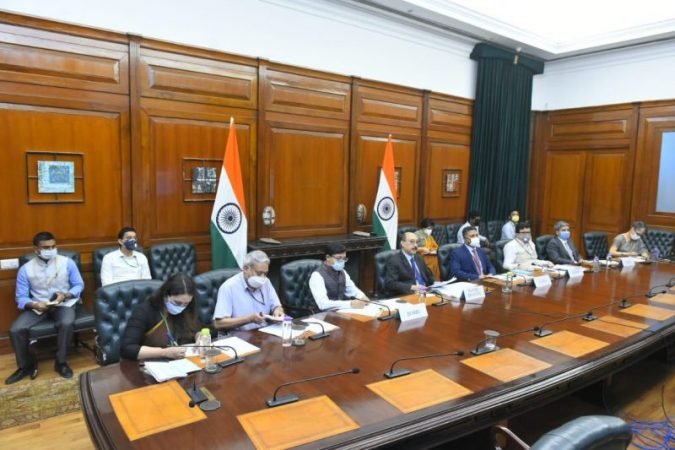India-US Foreign Office Consultation: Reshaping Strategic Partnership

Foreign Secretary Harsh Vardhan Shringla and the U.S. Under Secretary of State for Political Affairs David Hale held virtual Foreign Office Consultations on 7 July 2020. They reviewed the entire gamut of engagements under the India-US Comprehensive Global Strategic Partnership, including political, economic, commercial, regional and international cooperation. They also agreed to further strengthen the bilateral health partnership, including on pharmaceuticals and vaccine development in the backdrop of global pandemic Covid-19.
In a statement, the US State Department said: “Hale and Shringla agreed to consult closely on all challenges and endeavour to support each other’s objectives, adding the discussions included ongoing threats to the rules-based international order, maritime security, and the global response to the COVID-19 pandemic.”
It said both officials pledged to remain in close contact on regional and international issues of mutual concern.
They exchanged views on a number of regional and global issues of shared interest. They reaffirmed their commitment to work towards ensuring a free, open, inclusive, peaceful and prosperous Indo-Pacific. They agreed on the need to deepen cooperation in the United Nations, especially during India’s membership of the United Nations Security Council for the period 2021-2022. They also agreed to remain in touch and move forward on the bilateral agenda through a range of mechanisms like the 2+2 Ministerial that India will host later this year.
During the meeting when the two sides were discussing about the ways to further enhance mutually beneficial trade and people-to-people ties, India strongly raised with the US its decision to withdraw US visas from foreign students whose courses moved fully online. The US side took note and said they will keep the best interests of the students in mind and would try and mitigate the impact, statement by the officials.
In a statement, the Ministry of External Affairs said “The two sides discussed ways to further enhance mutually beneficial trade and people-to-people ties, including through visa facilitation for students and professionals.”
On July The US Immigration and Customs Enforcement (ICE) said “that those who are in America on an F-1 student visa or M-1 visa for vocational education will have to come back home if their courses have gone online due to the pandemic for the fall 2020 semester starting next month.”
This move by the U.S. government shocked the world. There more than one million students of foreign nationals (about 5.5 percent of the total U.S. higher.) and there are more than hundreds of thousands of Indian students in the U.S.
Some students are afraid they will lose their visa status and they have to give up years of study. Many Indian students who are in the U.S for higher education are on education loans. Most of them want to stay back in the U.S for better job opportunities which will help them to repay their education loans. But after this decision, many students are put into difficult situations.
Harvard University President Larry Bacow said “The new rule was designed “without regard to concerns for the health and safety of students, instructors, and others.”
Several universities called the new visa rule is in opposition to the Centers for Disease Control and Prevention guidelines about social distancing, avoiding large gatherings and wearing face masks to bring COVID-19 infection and death rates down.
According to a student, who is studying MS in Computer Science in one of the Leading university of U.S. said “I feel President’s decision regarding the international student leaving the country if University goes online, will only aggravate the COVID19 Situation. International students contribute at least half of the population of Universities. This decision will force the university to go on-campus mode, which will be devastating once all the students start taking the public transport, which might lead to the second wave of COVID19 causing the university to go online again. I believe I am saying this on behalf of all students when I say that We are confused as to why President’s administration is taking this decision when we contribute a large amount in States’ economy ?”


















